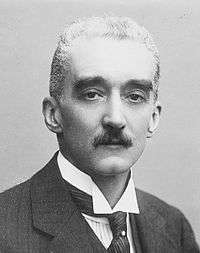Paul Hymans
| Paul Hymans | |
|---|---|
|
Paul Hymans | |
| Born |
Paul Louis Adrien Henri Hymans 23 March 1865 Ixelles/Elsene, Belgium |
| Died |
8 March 1941 (aged 75) Nice, France |
| Nationality | Belgium |
| Occupation | politician |
Paul Louis Adrien Henri Hymans (23 March 1865 – 8 March 1941), was a Belgian politician associated with the Liberal Party. He was the second President of the League of Nations, and served again as its president in 1932-33.
Hymans was the son of Belgian writer and historian Louis Hymans. He became a lawyer and professor at the Universite Libre de Bruxelles. As a politician he became Belgian Minister for Foreign Affairs from 1918 to 1920 (and again from 1927 to 1935), minister of justice from 1926 to 1927, and member of the council of ministers from 1935 to 1936. In 1919, together with Charles de Broqueville and Emile Vandervelde he introduced universal suffrage for all men (one man, one vote) and compulsory education.
After World War I, he represented Belgium at the 1919-1920 peace conference. Paul Hymans helped form the customs union of Belgium and Luxembourg (Belgium-Luxembourg Economic Union) in 1921 and played a leading part in negotiating the Dawes Plan in 1924. In 1928, he signed the Kellogg-Briand Pact for Belgium.
He was a freemason, and a member of the lodge Les Amis Philanthropes of the Grand Orient of Belgium in Brussels. Paul Hymans is interred in the Ixelles Cemetery in Brussels.
Bibliography
- Paul Hymans, Pages liberales (E: Liberal Notes), 1936
References
- Paul Hymans
- Helmreich, J.E., Paul Hymans and Henri Jaspar : Contrasting Diplomatic Styles for a small power, in : Studia Diplomatica, XXXIX, 1986, p. 669-682.
- Willequet, J., Les mémoires de Paul Hymans, in : Le Flambeau, 1958, nr. 9-10, p. 565-573.
External links
| Wikimedia Commons has media related to Paul Hymans. |
| Preceded by Léon Bourgeois |
President of the League of Nations 1920-1921 |
Succeeded by Herman Adriaan van Karnebeek |
